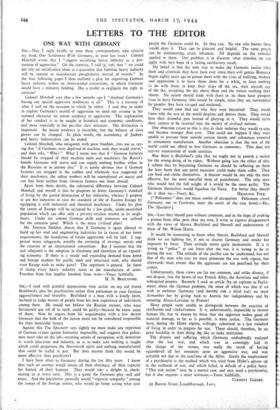Sta,—I read with grateful appreciation your article on my old
friend Brailsford's plea for psychiatrists rather than policemen to cure German aggressiveness and brutality. Brailsford is a man with a kindly heart, inclined to judge masses of people from his own experience of individuals among them. He would not believe the Russian traitors, who were fortunately got rid of in 1938, could be guilty—because he knew some of them. Now he argues from his acquaintance with a few decent Germans that the bulk of the nation must not be considered responsible for their homicidal lunacy.
Against this The Spectator says rightly we must make any repetition of German crimes against humanity impossible, and suggests that police- men must take on the job—meaning armies of occupation with detectives to watch education and industry, so as to make sure nothing is taught which could perpetuate the Herrenvolk spirit and nothing manufactured that could be useful in war. But does anyone think this would be more effective than psychiatry?
I have been often in Germany during the last fifty years. I know that such an attempt would arouse all their obstinacy, all their capacity for hatred, all their humour. They would take a delight in check- mating us at every turn. This is a game the Germans play well and enjoy. And the population generally would " organ:se sympathy " among the troops of the foreign armies, who would go home saying what nice people the Germans could be. So they can. No one who knows them would deny it. They can be pleasant and helpful. The same people can be domineering, cruel, inhuman. All depends on the stimulus applied to them. Our problem is to discover what stimulus we can apply with best hope of a lasting satisfactory result.
My belief is that the only way to make the Germans realise what fools and criminals they have been ever since their evil genius Bismarcx began eighty years ago to poison them with the virus of bullying, trickery and oppression is to leave them alone for a while, to have nothing to do with them, to keep their ships off the sea, their aircraft out of the sky, excepting the sky above them and the waters washing their shores. No nation should trade with them or let them have passport visas to leave Germany (this would be simple, since they are surrounded by peoples they have savaged and enslaved).
They would soon find out why they were boycotted. They would know why the rest of the world despises and detests them. They would hate their shameful past instead of glorying in it. They would strive their utmost to be received into the society of civilised nations.
One objection raised to this is that in their isolation they would re-arm and become stronger than ever. That could not happen if they were unable to procure from outside certain metals and substances essential to armaments manufacture. Another objection is that the rest of the world could not afford to lose Germans as customers. That does not survive examination of trade statistics.
Also there is Brailsford's plea that we ought not to punish a nation for the wrong-doing of its rulers. Without going into the ethics of this, I submit that by boycotting Germans we should be inflicting on them the least harm that any penal measures could make them suffer. They can feed and clothe themselves. A boycott would be not only the most effective, but the most merciful form of punishment. The only ones who would feel the full weight of it would be the most guilty. The Germans themselves would liquidate the Nazis. Far better they should do it than we.—Yours, &c., HAMILTON FYFE. [" Policemen " does not mean armies of occupation. Policemen round Germany, not in Germany, meet the needs of the case better.—En., The Spectator.]


























 Previous page
Previous page